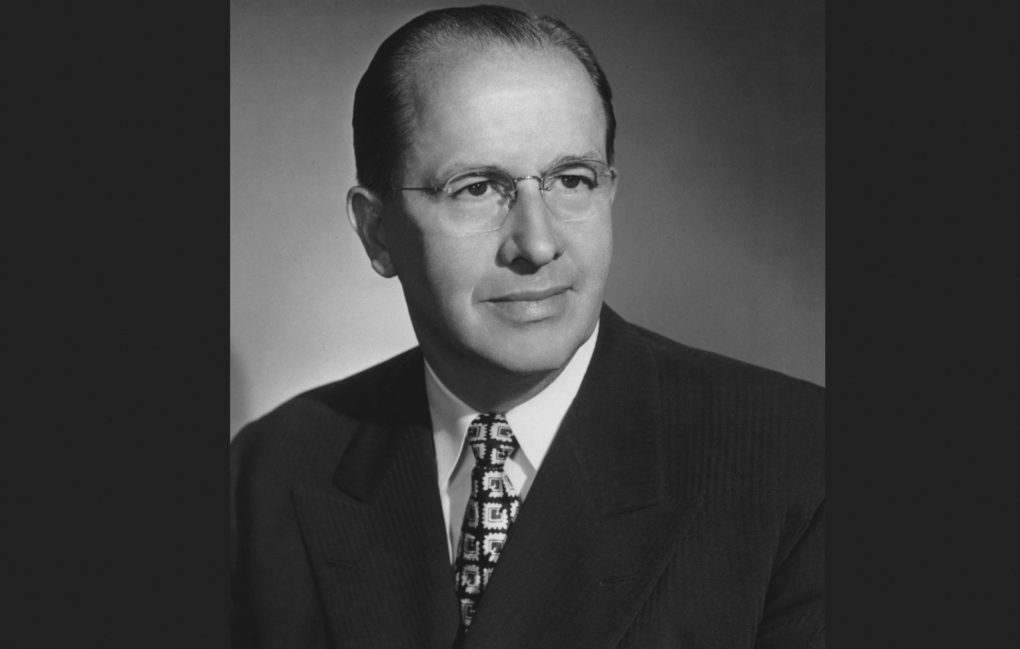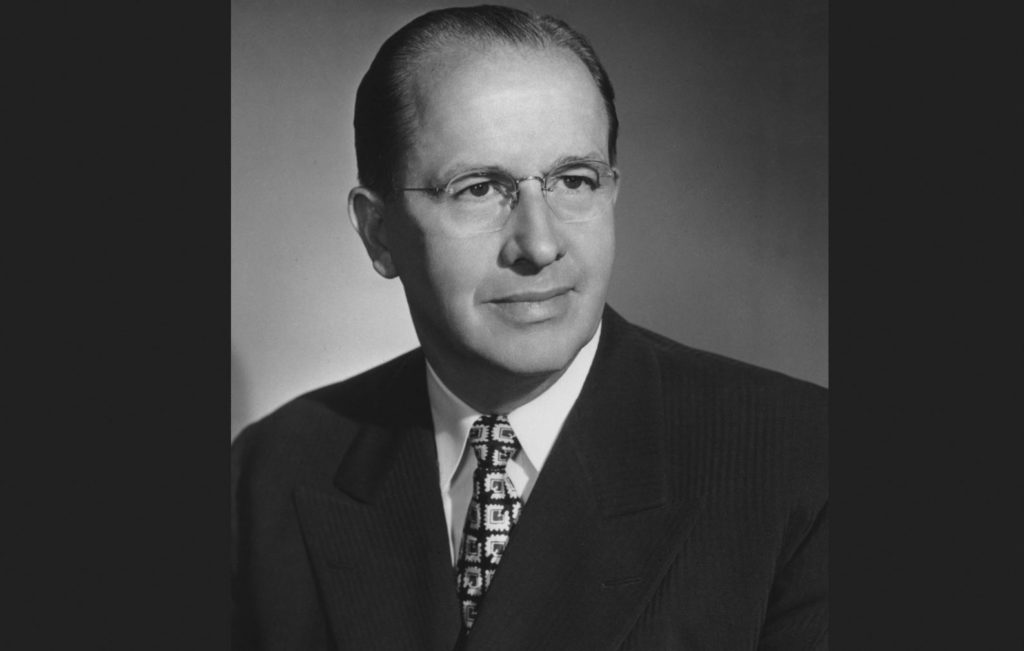A Farmer For Freedom: Ezra Taft Benson
Over the nearly four decades that Leonard Read served as president of the Foundation for Economic Education (1946-83), he attracted dozens of luminaries to its board of trustees. My association with FEE—as a reader, writer, speaker, board member, chairman and president—began in 1968, so I met and came to know a considerable number of them. Among those I did not have the good fortune to meet but wish I had, one name stands out: Ezra Taft Benson. His tenure on the FEE board spanned twelve years, from 1974 to 1986.
Born on a farm in Whitney, Idaho in 1899, Benson was raised by parents devoted to the Church of Jesus Christ of Latter-Day Saints (the Mormon faith). At the age of 12, he essentially managed his family farm for two years while his father performed missionary service in the American Midwest. Benson’s common sense and farm experience led him to sharply criticize the agriculture policies of President Franklin Roosevelt in the early 1930s. Subsidies, tax hikes, and price controls all left a bad taste in Benson’s mouth.
Widget not in any sidebars
In the aftermath of World War II, Benson played a key role in the LDS Church’s relief effort in devastated Europe. He supervised the distribution of tons of supplies to the needy in Germany and Poland in particular. On the front lines of oppression, he developed a passion against socialism and communism that would occupy his political and economic thoughts for the rest of his life and draw him to FEE and Leonard Read as well.
By 1952, Benson was well-known and respected not only in his native Idaho but throughout the country’s agricultural community. In the Republican primaries that presidential election year, he supported Ohio’s Robert Taft over Dwight Eisenhower. When Ike won the White House, he chose Benson as his Agriculture Secretary. Benson would go on to become the only member of the Cabinet to serve in his post for the entirety of Ike’s eight years as president.
Benson’s tenure in Washington was occasionally stormy. He opposed many of the federal interventions his Department was obliged by Congress to implement. He especially disliked the fact that the subsidies Congress approved usually went to large agri-businesses at the expense of small family farms. When he moved to reduce price controls, he was pelted with eggs by a group of farmers. But when he left office in January 1961, he was held in high regard as a man of conviction and honesty who did his best to get the federal government out of the way of the farmers he was brought to Washington to help.
Get Non-GMO storable food HERE!
In November 1985, with a few months to go before his final term on the FEE board ended, Benson became the 13th president of the Church of Jesus Christ of Latter-Day Saints. He served as the Church’s leader until his death at age 94 on May 30, 1994.
Because he wrote and spoke so much and so well, Benson ranks as one of the most quotable of FEE’s trustees. As was the case with Leonard Read, Benson believed that a moral component should accompany one’s economic education. He was on the same page with Leonard in stressing the critical importance of personal character and self-improvement, as these select quotes suggest:
- “Some of the greatest battles you will face will be fought within the silent chambers of your own soul.”
- “The way to feel better about your own situation is to improve someone else’s circumstances.”
- “Thoughts lead to acts, acts lead to habits, habits lead to character—and our character will determine our eternal destiny.”
- “Do not make your mind a dumping ground for other people’s garbage.”
Benson’s love of liberty comes through in all his books and articles that deal with political or economic issues. FEE’s trustees over the decades represent virtually every major faith, and a few were agnostic. But to a person, they all loved liberty (as do all those who presently serve on the board). I close with these samples of Benson’s wisdom that all of us at FEE still appreciate deeply today:
- “I don’t know how you feel, my brethren and sisters, but I’d rather be dead than to lose my liberty. I have no fear we’ll ever lose it because of invasion from the outside. But I do fear that it may slip away from us because of our own indifference, our own negligence, as citizens of this land. And so I plead with you this morning that you take an active interest in matters pertaining to the future of this country.”
- “Unlike the political opportunist, the true statesman values principle above popularity and works to create popularity for those political principles which are wise and just. How much this country needs men with a mandate higher than the ballot box!”
- “Let us first consider the origin of those freedoms we have come to know as human rights. Rights are either God-given as part of the divine plan, or they are granted by government as part of the political plan. Reason, necessity, tradition, and religious convictions all lead me to accept the divine origin of these rights. If we accept the premise that human rights are granted by government, then we must be willing to accept the corollary that they can be denied by government.”
- “If Americans should ever come to believe that their rights and freedoms are instituted among men by politicians and bureaucrats, then they will no longer carry the proud inheritance of their forefathers, but will grovel before their masters seeking favors and dispensations, a throwback to the feudal system of the Dark Ages.”
- “Man is superior to government and should remain master over it, not the other way around.”
- “We should recognize that government is no plaything. It is an instrument of force; and unless our conscience is clear that we would not hesitate to put a man to death, put him in jail, or forcibly deprive him of his property for failing to obey a given law, we should oppose that law.”
- “If we permit government to manufacture its own authority, and to create self-proclaimed powers not delegated to it by the people, then the creature exceeds the creator and becomes master. Who is to say, “this far, but no farther?” What clear principle will stay the hand of government from reaching farther and farther into our daily lives?”
- “Some leaders may be honest and good but unwise in legislation they choose to support. Others may possess wisdom but be dishonest and unvirtuous. We must be concerted in our desires and efforts to see men and women represent us who possess all three of these qualities.”
Source: FEE.org
Lawrence W. Reed is President Emeritus and Humphreys Family Senior Fellow at FEE, having served for nearly 11 years as FEE’s president (2008-2019). He is author of the 2020 book, Was Jesus a Socialist? as well as Real Heroes: Incredible True Stories of Courage, Character, and Conviction and Excuse Me, Professor: Challenging the Myths of Progressivism. Follow on LinkedIn and Twitter and Like his public figure page on Facebook. His website is www.lawrencewreed.com.
Image credit: US Department of Agriculture on Flickr | Public Domain
Subscribe for natural health news to your inbox. Follow Natural Blaze on YouTube, Twitter and Facebook.




